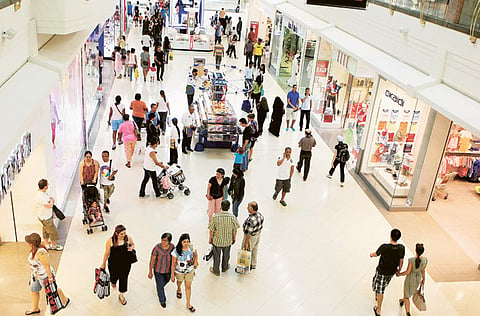Consumer sentiment in region falls
Confidence in UAE static as figures in Mena region negative, study reveals

Dubai: Consumer confidence in the Middle East and North Africa (Mena) has fallen in key markets in the region while remaining static in the UAE, a report has shown.
The study, by analysis and research company Nielsen, revealed that confidence in the last quarter of 2011 fell furthest in Saudi Arabia, followed by Egypt.
The results, which are based on an online survey of 28,000 internet consumers conducted in 56 countries, showed an overall decline in 35 out of the 56 global markets.
In the Middle East and Africa, confidence fell by one point, and Europe recorded its lowest regional confidence reading since the first quarter of 2009 at 71 points, a quarterly decline of three points. A score above 100 shows positive growth, while below 100 is negative.
"While Europe's challenging economic conditions in the second half of 2011 bought renewed vulnerability and fragility to consumers and financial markets globally, some of the most positive news last quarter came from the world's two largest economies — the US and China — where confidence rebounded to first quarter 2011 levels," said Dr Venkatesh Bala, chief economist at The Cambridge Group, a part of Nielsen.
In the six Middle East and African markets covered by the Nielsen survey, confidence rose three points in Pakistan, dropped seven in Saudi Arabia and five in Egypt while it remained flat in UAE at 105.
Austerity measures
"Political turmoil in the Middle East and doubts over future oil demand, which is indispensible for the Saudi economy, and subsequent austerity measures have led to depressed consumer sentiments in Saudi Arabia," said Arslan Ashraf, managing director, Nielsen Saudi Arabia.
"However, through hefty stimulus packages, the Saudi government is making efforts to insulate the economy from these global and regional developments."
"Egypt's turbulent political year in 2011, led to rising food prices and a slide in foreign reserves as tourism and export businesses suffered from the dramatic current events," said Ram Mohan Rao, managing director, Nielsen Egypt.
David Macadam, head of retail for Middle East and North Africa and regional director at Jones Lang LaSalle, told Gulf News that although there are a number of issues going on in the region, people's spending habits are still considered strong. "My sentiment is that it's still overall positive," he said.
The top concern for one in five consumers in the Middle East and Africa is job security — five points higher than the global average.
Worries over political stability and the economy are two other top concerns among 12 per cent of respondents, the report said.
"People are still keen on buying new things for their houses and buying things for their families when they come here," he said, explaining that while the sentiment may be negative it hasn't impacted people's spending habits in the region.
North America
North America posted the biggest regional quarterly gain among global regions with an increase of 5 points to 84. Asia Pacific and Latin American were the world's most confident regions with quarterly increases of two and one point(s) respectively.
For the eighth consecutive quarter, India remained the most optimistic in the world with one point consumer confidence index increase to 122, according to Nielsen.
It is followed by Indonesia and the Philippines at 117.
Hungary was the world's most pessimistic market at 30 index points, followed by Portugal (36) and Greece (41).
European markets accounted for nine of the 10 most depressed markets last quarter.
The biggest quarterly confidence gains came from Romania (+10), the United States and Australia (+6), Venezuela, Philippines and Columbia (+5) and China (+4), while the steepest quarterly declines came from Taiwan (-16), Czech Republic (-12), Greece (-10) and Belgium (-9).
- 122: India's consumer confidence index
- 117: consumer confidence in Philippines, Indonesia
- 113: consumer confidence in Saudi Arabia
Sign up for the Daily Briefing
Get the latest news and updates straight to your inbox



